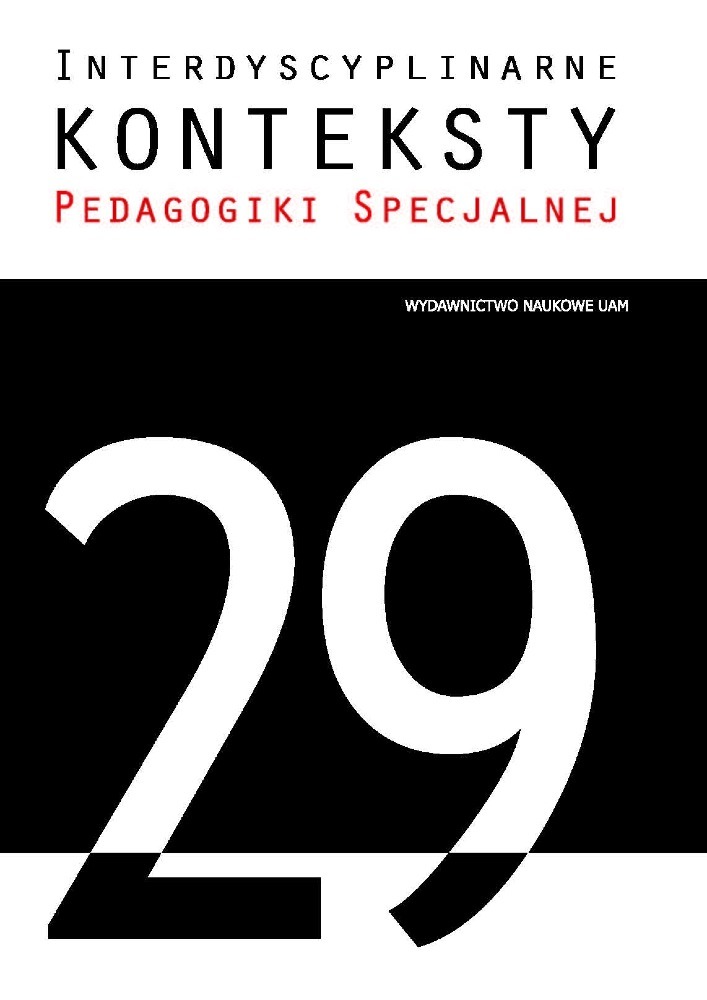Abstrakt
In the paper, the author discusses educational interactions focused on a child with autism. The first part of the study presents the characteristics of functioning of an autistic child, taking into account specific needs and difficulties. The research material was used to present the specificity of child’s functioning in certain developmental spheres: socio-emotional sphere, cognitive sphere, self-care, communication, sensory integration and motor integration. Bearing in mind a multi-profile diagnosis of the disorder and including various spheres of child’s functioning, the diagnosis was referenced to programming the process of support. The author concludes by presenting a reflection on dilemmas and challenges in education of autistic children.
Bibliografia
Affolter F., Spostrzeganie, rzeczywistość, język [Perception, reality, language], WSIP Publishing House, Warsaw 1997.
Bigas U., Autyzm – charakterystyka zachowań językowych w autystycznym spektrum zaburzeń [Autism – the characteristics of linguistic behaviour in autism spectrum disorder], [in:] S. Grabias, M. Kurkowski, Logopedia. Teoria zaburzeń mowy [Speech-language pathology. Theory of speech disorders], UMCS Publishing House, Lublin 2012.
Bluestone J., Materia autyzmu. Łączenie wątków w spójną teorię [The matter of autism. Combining threads into a coherent theory], Publisher: Rozwiązać Autyzm Foundation, Warsaw 2012.
Bleszynski J., Terapie wspomagające rozwój osób z autyzmem [Therapies supporting the development of people with autism], IMPULS Publishing House, Krakow 2004.
Charman T., Bair G., Practitioner review: Diagnosis of autism spectrum disorder in 2- and 3-year-old children, ”Journal of Child Psychology and Psychiatry” 2002, No. 43.
Chrzanowska I., Wiedza na temat autyzmu wśród obecnych i przyszłych pedagogów a dylemat wspólnego kształcenia i integracji w wymiarze edukacyjnym [Knowledge about autism among current and future teachers and the dilemma of joint education and integration in the educational dimension], [in:] Rocznik Lubuski [Lubusz Annal], vol. 38, part 2.
Dawidiuk I., Wpływ diety na zachowania autystyczne [The influence of diet on autistic behaviours], [in:] B. Wilczura, Autyzm [Autism], Impuls Publishing House, Krakow 2009.
Delacato C.H., Dziwne, niepojęte. Autystyczne dziecko [Strange, Incomprehensible. An autistic child], SYNAPSIS Publishing House, Warsaw 1995.
Frith U., Autyzm. Wyjaśnienie tajemnicy [Autism. The secret demystified], GWP Publishing House, Gdańsk 2008.
Galkowski T., Kossewska J., Autyzm wyzwaniem naszych czasów [Autism as a challenge of our times], Scientific Publishing House of the Pedagogical Academy in Krakow, Kraków 2000.
Lobocki M., Metody i techniki badań pedagogicznych [Methods and techniques of pedagogical research], IMPULS Publishing House, Kraków 2000.
Maciarz A., Biadasiewicz M., Dziecko autystyczne z zespołem Aspergera. Studium przypadku [Autistic child with Asperger’s syndrome. Case study], IMPULS Publishing House, Kraków 2000.
Markiewicz K., Możliwości komunikacyjne dzieci autystycznych [Communication skills of autistic children], UMCS Publishing House, Lublin 2004.
McCandless J., Dzieci z głodującymi mózgami. Przewodnik terapii medycznych dla spektrum autyzmu [Children with starving brains. Guide to medical therapies for autism spectrum disorder], Fraszka Edukacyjna Publishing House, Warsaw 2007.
Olechnowicz H., Wokół autyzmu. Fakty, skojarzenia, refleksje [Around autism. Facts, associations, reflections], WSiP Publishing House, Warsaw 2003.
Pilch T., Wujek T., Metody i techniki badań w pedagogice [Methods and techniques of research in pedagogy], [in:] M. Godlewski, S. Krawcewicz, T. Wujek, Pedagogika [Pedagogy], Warsaw 1974.
Pisula E., Autyzm u dzieci. Diagnoza, klasyfikacja, etiologia [Autism in children. Diagnosis, classification, aetiology], PWN Publishing House, Warsaw 2000.
Pisula E., Autyzm: przyczyny, symptomy, terapia [Autism: causes, symptoms, therapy], Harmonia Publishing House, Gdańsk 2010.
Smith D., Pedagogika specjalna [Special Pedagogy], APS Publishing House, Warsaw 2008.
Szczypczyk A., Kossewska J., Kompleksowe wspomaganie rozwoju uczniów z autyzmem i zaburzeniami pokrewnymi [Comprehensive support for the development of students with autism and related disorders], Impuls Publishing House, Krakow 2009.
Tatarkiewicz W., Historia filozofii, T. 3 [History of Philosophy, Volume 3], PWN Publishing House, Warsaw 1999.
Wasilewska J., Jarocka-Cyrta E., Kaczmarski M., Patogeneza zaburzeń przewodu pokarmowego u dzieci z autyzmem [Pathogenesis of gastrointestinal disorders in children with autism], „Polski Merkuriusz Lekarski” [Polish Medical Herald] 2009, vol. 27, No. 157.
Winczura B., Dziecko z autyzmem. Terapia deficytów poznawczych a teoria umysłu [Child with autism. The therapy of cognitive deficits and the theory of mind], Impuls Publishing House, Kraków 2008.
Wing L., Związek między zespołem Aspergera i autyzmem Kannera [The relationship between Asperger’s syndrome and Kanner’s autism], [in:] U. Frith, Autyzm i zespół Aspergera [Autism and Asperger’s syndrome], Publishing House: Państwowy Zakład Wydawnictw Lekarskich, Warsaw 2005.
Zablocki K.J., Autism [Autyzm], Novum Publishing House, Płock 2002.
Internet sources
Czarnocka M., Jak pracować z uczniem autystycznym? [How to work with an autistic student?], material available online: <https://www.portaloswiatowy.pl/pomocpsychologicznopedagogiczna/jak-pracowac-z-uczniem-autystyczny-11691.html> [Accessed on 26.05.2020].
Piotrowicz R., Wczesne wspomaganie rozwoju dziecka – kompleksowe wsparcie terapeutyczne dziecka i rodziny. Diagnoza a program [Early support of child development – comprehensive therapeutic support for children and families. Diagnosis and program], ORE [Education Development Centre], material available online: <https://www.ore.edu.pl/programy-i-projekty-69647/wczesne-wspomaganierozkietadziecka/materialy-do-pobrania> [Accessed on 28.05.2020].
Pyzalski J., Jak uczyć i wspierać współpracę w klasie [How to teach and support collaboration in the classroom], material available online: <http://www.macmillan.pl/szkolenia/small-talks/3376-jak-uczyc-i-wspierac-wspolprace-w-klasie> [Access on 01.06.2020].
